Your Journey to Dynamics 365 Starts Here!
Fill in your business details and let
us be your partner in growth.
The Growth and the Current State of Online Shopping in the USA
The Online Shopping Boom
Over the past two decades, eCommerce has changed US retail. In the early 2000s, internet shopping was a supplement to physical storefronts, but technology and consumer expectations have made eCommerce popular. Today, US eCommerce revenue is expected to reach $1.9 trillion U.S. dollars by 2029.

The Impact of the COVID-19 Pandemic
When the COVID-19 pandemic hit, businesses had no choice but to adapt, and going online became the name of the game. Companies that were already digital-first handled the shift like pros, showing just how important it is to have a solid online presence to keep things running smoothly. The explosion of eCommerce during this time was a real game-changer, even nudging traditional retailers to jump on the digital bandwagon or strengthen their online stores.
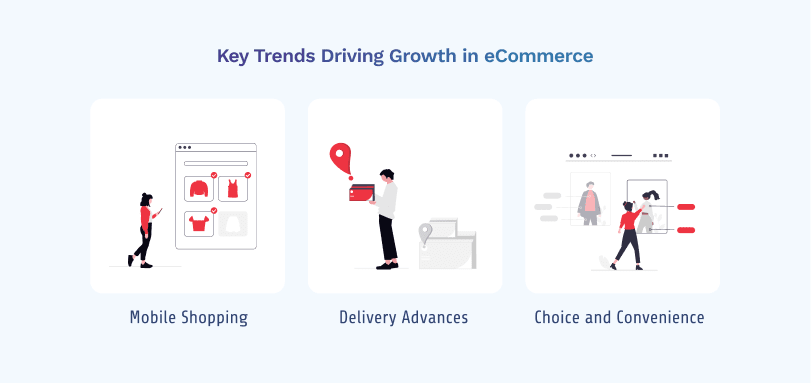
Key Trends Driving Growth in eCommerce
1.2 - Challenges Faced by Modern eCommerce Businesses
Complexity of Supply Chain
Due to the vastness of the market, eCommerce companies face challenges such as managing inventory, fulfilling orders, and offering speedy and sometimes cost-free shipping to target consumers. The intricacies of the supply chain require effective scheduling and optimization planning, especially during high-demand purchase times like Black Friday and the Christmas period.
Fierce Competition
Nowadays, it is easy for consumers to access various online marketplaces and purchase a variety of products. Companies are required to differentiate their business offerings and customer experience; they are mostly competing on price, quality, and convenience of the product provided.
Changing Customer Behaviors
The focus of modern customers is on accomplishing and completing transactions quickly, obtaining a degree of personalization, and being able to access a reliable source of good service. Such demands can be met only if businesses are ready to implement new technological advances focusing on automated processes, real-time analytics and reporting, and unique interactions with clients.
Financial Management Complexity
1.3 - The Role of Technology in eCommerce
ERP Systems to Unified Operations
Systems like Dynamics 365 Business Central integrates inventories, customer data, orders, and financials. Having a one-place management system simplifies processes and enables organizations to better respond to changing markets.
Automation for Growth
Business Intelligence Decision-Making
Data analytics makes it possible for the organization to predict the general trend of customers' purchasing behavior, inventory supply, and selling of goods in the market. Businesses utilize data in real-time to make decisions and realign strategies according to the situations.
AI for Better Customer Experience
1.4 - The Role of Dynamics 365 Business Central
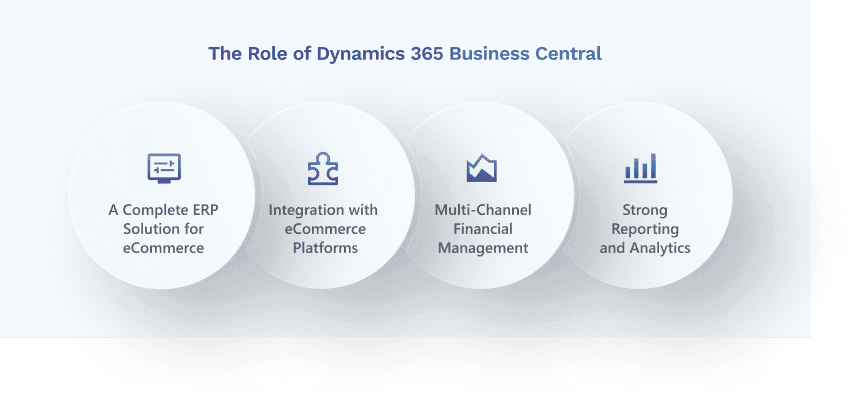
A Complete ERP Solution for eCommerce
Microsoft Dynamics 365 Business Central is perfect for eCommerce businesses as it is a cloud-based ERP. It organizes a company’s business activities by bringing together finances, inventory, and sales in one place.
Integration with Popular eCommerce Platforms
Improved Multi-Channel Financial Management
In Business Central, you can easily configure taxes and currencies, as well as complex financial reporting. This financial visibility is of utmost importance for ecommerce businesses in order to make sure that they are adhering to compliance, especially when dealing with different states or countries.
Strong Reporting and Analytics
Business Central helps firms track how they perform, spot customer trends, and make smart decisions using built-in reports and tools. This is crucial for eCommerce firms trying to grow and stay competitive in a quick-moving market.
The US eCommerce world is marked by fast growth, higher customer demands, and tough business rivals. Managing supply chains, keeping customers happy, and watching finances are big challenges for today’s firms. Tools like ERP systems, such as Dynamics 365 Business Central, make it easier. Business Central ties systems together, automates tasks, and shows useful data to help eCommerce firms succeed online.
In the next part, we’ll explore how Dynamics 365 Business Central works as a full ERP solution for eCommerce companies.
2.1 - What is an ERP System and How Can It Help eCommerce?
What is ERP for eCommerce?
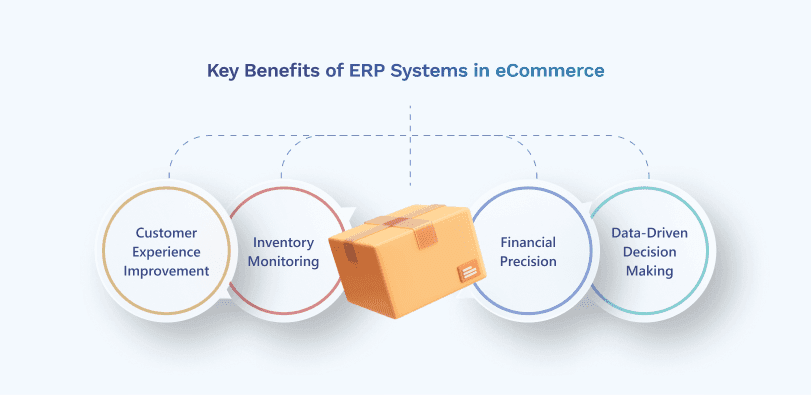
Enterprise resource planning (ERP) systems are fully integrated software applications that let organizations control and coordinate key business activities such as the management of inventories, finances, sales, customer relations, and logistics. In eCommerce, ERPs facilitate operations by systematizing all important operational activities that link together in one core process with a single database.
For firms engaged in multi-channel selling and quick order-processing activities in a low-cost environment, an ERP enables smooth functioning processes across the board and allows for holistic interaction with data for instantaneous decisions.
Key Benefits of ERP Systems in eCommerce
2.2 - Types of ERP Solutions Available for eCommerce Businesses
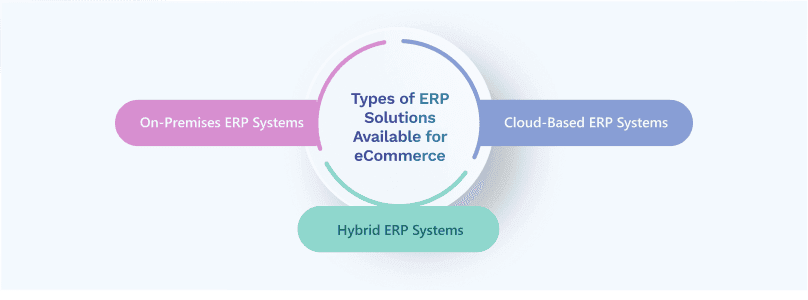
On-Premises ERP Systems
Installed straight on the company's hardware and servers, on-site or on-premises ERPs give companies total control over their data and system operations. For big companies with strict data security needs and strong IT infrastructure, they can be perfect. Still, they usually call for continuous upkeep and large upfront expenses.
Cloud-Based ERP Systems
Operating on a SaaS (Software as a Service) paradigm, cloud-based ERPs including Dynamics 365 Business Central, where the provider hosts and manages the software. Owing to their adaptability, scalability, and ease of use from anywhere with an internet connection, these ERPs are rather popular in eCommerce. As they are frequently updated and have low upfront costs, they are considered to be ideal for an expanding company.
Hybrid ERP Systems
Hybrid ERPs mix aspects of on-site and cloud systems. While employing cloud capabilities for other activities, companies can save critical data on-site. Though it involves more complicated connections and management, this configuration is perfect for businesses trying to balance data control with the flexibility of cloud services.
2.3 - Why eCommerce Companies Choose Cloud ERPs
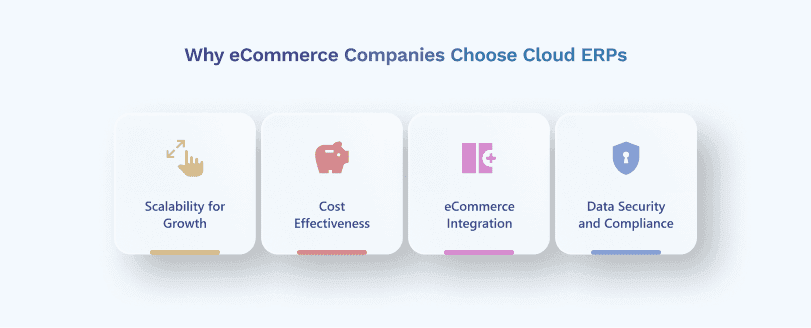
Scalability for Growth
Online retailers with changing demand and seasonal spikes benefit from cloud-based ERPs, which allow module addition and modification. Businesses can scale by adding users, data storage, or features without major hardware upgrades. High-growth eCommerce requires this flexibility.
Cost-Effectiveness
Cloud-based ERPs are subscription-based and need less upfront investment than on-premises ones. Small-to-medium eCommerce enterprises that need comprehensive ERP capabilities without the capital investment of on-premises equipment can use them. IT costs are reduced via automatic upgrades and minimum maintenance.
Smooth eCommerce Integration
Dynamics 365 Business Central and other cloud-based ERPs integrate with Shopify, Magento, and WooCommerce. This unifies inventories, orders, customer data, and financials, improving efficiency and accuracy. Integration eliminates data silos, simplifying multi-channel operations and customer experience.
Improved Data Security and Compliance
Cloud-based ERPs offer enhanced data encryption, regular security updates, and GDPR compliance as cybersecurity worries mount. Microsoft invests substantially in cloud security, making Dynamics 365 Business Central safer than in-house solutions, especially for small and mid-sized eCommerce firms without cybersecurity staff.
2.4 - Comparing Popular ERP Solutions for eCommerce
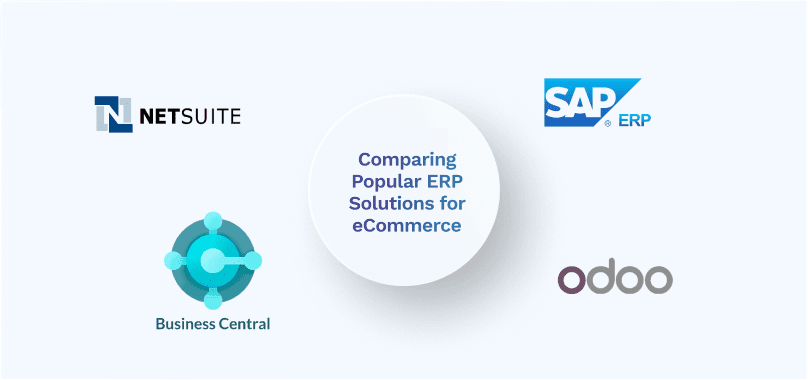
SAP Business One
SAP Business One ERP is for SMBs and is known for its advanced inventory management and financial features. It integrates with eCommerce systems but may require substantial customization.
NetSuite by Oracle
NetSuite's cloud-based ERP integrates CRM, eCommerce, and financial management. Due to its customization choices and worldwide support, complicated multi-channel organizations choose it.
Odoo
Odoo, an open-source ERP solution, offers eCommerce inventory, accounting, and CRM apps. It is modular, so businesses can tailor it as they grow. Though cheaper, it may lack enterprise-level ERP functionalities and capabilities expansion through pre-built connectors.
Dynamics 365 Business Central by Microsoft
Cloud-based Dynamics 365 Business Central is tailored to small-to-medium eCommerce enterprises. It offers operational and financial management tools and integrates very well with Microsoft's ecosystem and top eCommerce platforms. The user-friendly interface, frequent updates, and scalability of Business Central help eCommerce companies seeking to simplify processes without expensive IT infrastructure.
2.5 - Key Factors to Consider When Selecting an ERP Solution
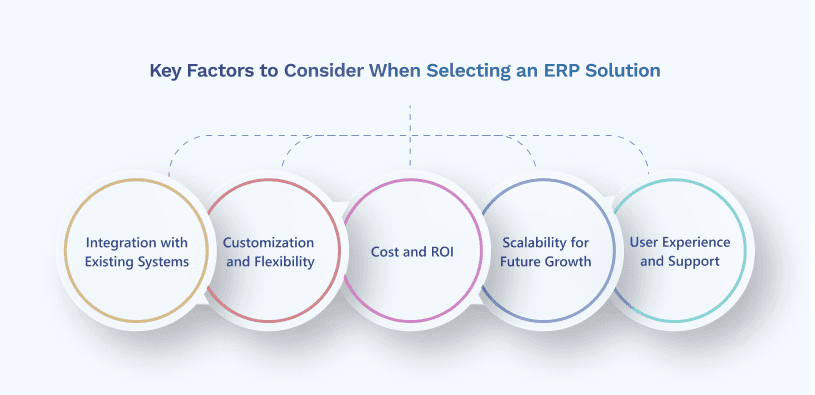
1. Integration with Existing Systems
eCommerce firms need an ERP that connects with eCommerce platforms, POS systems, and CRM software. Integration reduces errors and laborious data entry by combining channels.
2. Customization and Flexibility
The scope of ERP customization for specific company operations is crucial. Flexibility in the ERP will save time and money on workarounds and additional software since each eCommerce business has its unique workflows and needs.
3. Cost and ROI
Businesses can calculate the ERP's ROI by assessing its total cost of ownership, including subscription costs, implementation, and maintenance. ERPs, especially cloud-based ones like Business Central, offer high capability at low prices.
4. Scalability for Future Growth
Growing eCommerce firms have different operational needs. ERPs that scale with the business reduce the cost of migrations and updates. Scalability considers user capacity, data storage, and functionality.
5. User Experience and Support
ERPs with intuitive user interfaces and robust support shorten learning curves and boost employee productivity. A responsive customer support team and regular updates from the provider ensure organizations run efficiently without technical issues.
In summary, eCommerce firms aiming to streamline operations, improve customer experiences, and scale must choose the correct ERP solution. Dynamics 365 Business Central is a complete, cloud-based ERP that fulfills the needs of growing eCommerce enterprises, unlike SAP, NetSuite, and Odoo. Business Central provides a solid basis for firms seeking digital success with its integration, cost-effectiveness, and scalability.
3.1 - Dynamics 365 Business Central Overview
What is Dynamics 365 Business Central?
Microsoft Dynamics 365 Business Central is a cloud-based ERP solution that automates fundamental company processes. Business Central, part of Dynamics 365, integrates with Office 365, Power BI, and Azure to manage finance, sales, inventory, customer service, and more for eCommerce enterprises. This integration helps firms centralize operations, streamline data management, and make data-driven choices.
Key Modules for eCommerce in Dynamics 365 Business Central
Dynamics 365 Business Central has eCommerce-related modules:
3.2 - Integration Capabilities for eCommerce
Seamless eCommerce Platform Integration
Integration with Shopify, Magento, WooCommerce, and BigCommerce is one of the best capabilities of Dynamics 365 Business Central. To centralize inventory, order processing, and customer data, firms can integrate data across channels. Real-time data synchronization ensures correct stock levels, sales, and customer interactions and decreases errors and manual data entry.
Integration of 3PL (Third-Party Logistics)
Dynamics 365 Business Central integrates 3PLs pretty well for eCommerce enterprises. Businesses can reduce manual operations and ensure correct, timely delivery by linking with 3PL systems to automate shipment information, order tracking, and inventory updates.
Support for EDI (Electronic Data Interchange)
EDI is essential for firms with many suppliers or high transaction volumes. EDI in Dynamics 365 Business Central automates the exchange of crucial business documents such as invoices, Pos, and shipping notifications to simplify supplier communication and order processing while reducing errors. This feature is useful for companies with big retail partners or suppliers that require EDI compliance.
3.3 - Key Reasons of Choosing Dynamics 365 Business Central for eCommerce
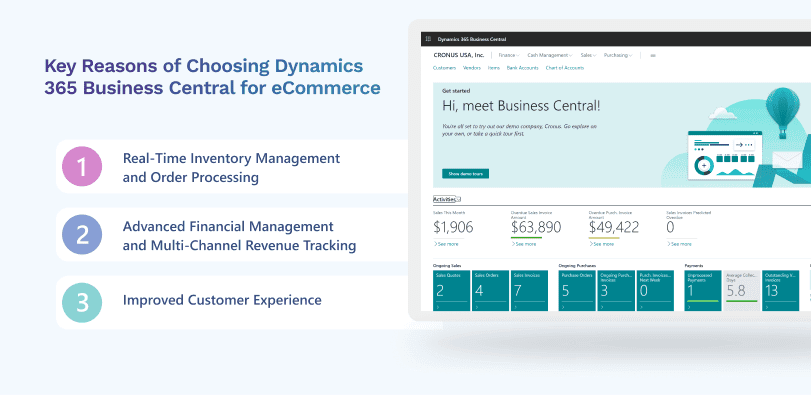
1. Real-Time Inventory Management and Order Processing
Customer satisfaction and avoiding costly stockouts need rapid and precise inventory management in eCommerce. Dynamics 365 Business Central provides real-time inventory insight across channels and locations. Businesses can track inventory levels, reorder points, and stock transfers automatically to meet demand, manage stock, and avoid overstocking and spoiling.
2. Advanced Financial Management and Multi-Channel Revenue Tracking
The financial module of Dynamics 365 Business Central handles the complicated financial needs of eCommerce firms across channels, states, and countries. Business Central streamlines financial management and compliance with multi-currency, tax compliance, and consolidated financial reporting. It tracks cash flow and analyzes multi-channel revenue, helping eCommerce organizations understand profitability by channel, product line, or customer segment.
3. Improved Customer Experience
Success in eCommerce depends on customer experience. Dynamics 365 Business Central streamlines order processing, inventory management, and personalization to improve customer service. The technology gives customer care teams real-time access to order history, inventory, and return processing, enhancing responsiveness and accuracy during customer interactions.
3.4 - Analytics and Reporting for Strategic Insights
Comprehensive Data Analytics
Dynamics 365 Business Central helps eCommerce organizations manage KPIs and analyze trends with comprehensive analytics. Built-in Power BI integration lets organizations create custom dashboards and track sales, inventories, and finances in real-time. These insights help firms optimize operations, make data-driven choices, and find growth possibilities.
Demand Forecasting with Predictive Analytics
Dynamics 365 Business Central provides real-time insights and predictive analytics for demand forecasting. The ERP uses previous data to predict demand, helping firms avoid overstocking and plan for high-demand periods. This functionality benefits eCommerce enterprises with seasonal product lines or rapid expansion.
Forecasting Tools: Forecast sales trends using past data for better stock management and peak season planning.
Improved Budgeting and Financial Planning: Analyzing past performance enables precise estimates and realistic budgets for future growth.
3.5 - Scalability and Flexibility to Support Growth
Cloud-Based Flexibility
As a cloud-based solution, D365 Business Central lets eCommerce organizations add users, storage, and features as they grow. Businesses can scale without delays or expensive infrastructure investments due to this flexibility.
Automated Updates
One benefit of a cloud-based ERP like Business Central is that Microsoft upgrades it regularly. Since the ERP has the latest features and security advancements, you don’t need to rely on the expertise of IT support. For eCommerce organizations, this means meeting the newest industry requirements without the hassle of manual upgrades.
In summary, Dynamics 365 Business Central is a powerful ERP solution for eCommerce companies aiming to streamline operations, manage inventory, and scale. This Dynamics ERP meets the demands of eCommerce enterprises with comprehensive integration capabilities, real-time analytics, and strong financial management. For enterprises trying to compete in a fast-paced digital market, its cloud-based scalability and flexibility let them grow without restrictions.
4.1 - Essential Features for eCommerce Businesses
Operations, inventories, and customer expectations become more complicated as eCommerce grows. Dynamics 365 Business Central has capabilities like automated inventory management and financial integration to handle these issues. It is a robust ERP solution for eCommerce firms looking to optimize processes, improve productivity, and boost customer happiness. Let’s check them out in detail in the following sub-sections.
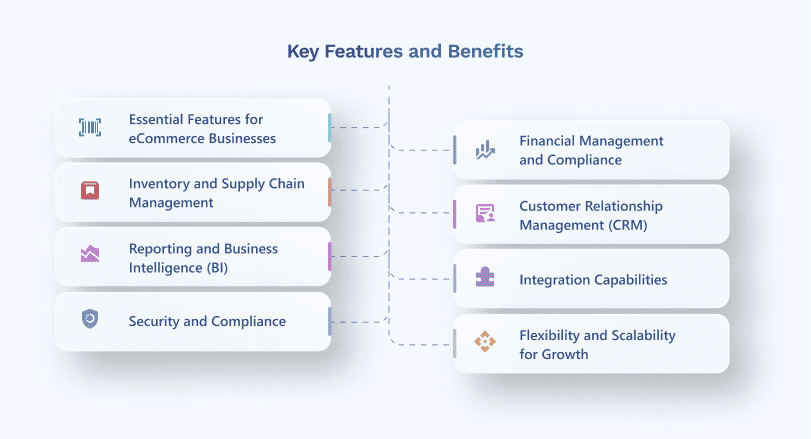
4.2 - Inventory and Supply Chain Management
Live Inventory Tracking
Managing inventories across numerous sales channels is a major eCommerce concern. Real-time inventory tracking in Dynamics 365 Business Central helps firms avoid stockouts and overstocking. Automatic alerts and intelligent forecasts help firms stock the appropriate products at the right time.
Key benefits:
Warehouse Management
Strong warehouse management solutions in Dynamics 365 Business Central improve pick-pack-ship procedures. ERP tools like barcode scanning, warehouse layout management, and bin tracking optimize warehouse operations and eliminate human error. This is useful for eCommerce organizations with several SKUs and frequent order fulfillment.
Key benefits:
Order Management and Fulfillment
The order management system available in this Microsoft Dynamics ERP handles processing, shipping, and tracking in one place. It delivers a single view of the order lifecycle, from receiving orders on many platforms to tracking them and managing returns, assuring prompt and correct order fulfillment.
Key benefits:
4.3 - Financial Management and Compliance
Automated Accounting and Financial Reporting
Dynamics 365 Business Central automates accounting for eCommerce enterprises with significant transaction volumes. It helps firms keep accurate financial records and provide detailed reports by centralizing sales, expenses, and inventory data.
Key benefits:
Multi-Currency and Tax Management
Global eCommerce businesses often deal with multiple currencies and tax jurisdictions. Business Central simplifies this with automated multi-currency handling, tax calculation, and compliance support, ensuring businesses remain compliant with regulatory requirements across different regions.
Key benefits:
4.4 - Customer Relationship Management (CRM)
Customer Analytics and Personalization
Built-in CRM solutions in Dynamics 365 Business Central help eCommerce organizations identify customer preferences, behavior, and purchase history. This data helps tailor marketing and improve customer service, increasing engagement and loyalty.
Key benefits:
Customer Service Management
The ERP provides tools to manage customer queries, complaints, and returns in a streamlined manner. Customer service teams can access a customer’s full order history and status, which allows them to address concerns promptly and accurately. This feature is vital for maintaining a positive customer experience, especially in competitive eCommerce landscapes.
ERP tools streamline customer inquiries, complaints, and returns. Customer care staff can quickly and accurately answer problems by accessing order history and status. This feature is essential for consumer satisfaction, especially in competitive eCommerce environments.
Key benefits:
4.5 - Reporting and Business Intelligence (BI)
Custom Dashboards & Real-Time Reporting
Business Central's comprehensive reporting capabilities provide real-time insights into sales, inventory, and financial performance. Customized dashboards powered by Microsoft Power BI help businesses visualize data and make strategic decisions.
Key benefits:
Demand Forecasting with Predictive Analytics
Predictive analytics in the ERP help eCommerce firms forecast demand, optimize inventories, and plan for peak seasons. Business Central predicts sales trends based on previous data, enabling proactive inventory and marketing planning.
Key benefits:
4.6 - Integration Capabilities
Seamless eCommerce Platform Integration
Dynamics 365 Business Central integrates with Shopify, Magento, and WooCommerce. Integrating orders, inventory, and customer data creates a consolidated view of all sales channels.
Key benefits:
Integration with 3PL and Shipping Providers
Business Central's integration features enable order and shipment data interchange for eCommerce enterprises using 3PLs. Faster order fulfillment, faster shipment, and accurate order tracking boost customer satisfaction.
Key benefits:
Electronic Data Interchange (EDI) Support
eCommerce companies with big supply chains or complicated B2B transactions need EDI. Dynamics 365 Business Central supports EDI for faster, automated supplier and business partner communication, boosting order accuracy.
Key benefits:
4.7 - Security and Compliance
Robust Data Security Features
Dynamics 365 Business Central, hosted on Microsoft Azure, includes encryption, access control, and regular security updates. Security is ensured for important customers’, financial, and operational data.
Key benefits:
Compliance with Industry Regulations
Microsoft Dynamics 365 Business Central simplifies compliance for highly regulated eCommerce firms. GDPR, financial reporting, and industry-specific laws are supported by the ERP, reducing internal team workload and compliance concerns.
Key benefits:
4.8 - Flexibility and Scalability for Growth
Modular Functionality for Tailored Needs
Business Central's modularity lets eCommerce companies customize the ERP to their particular needs. Businesses can add or expand modules to keep the ERP in line with their operational needs.
Key benefits:
Global Accessibility and Mobile Support
The cloud-based design of this Dynamics ERP lets teams collaborate and access data anywhere. The ERP is mobile-friendly, making it easier for managers and teams to stay connected and productive.
Key benefits:
Dynamics 365 Business Central has live inventory tracking, financial management, CRM, and powerful integrations for eCommerce success. Besides, the aforementioned features and benefits of Business Central make it a complete ERP solution for eCommerce enterprises competing in a fast-changing digital industry.
5.1 - Preparing for Implementation
Successful implementation begins with preparation:
5.2 - Costs, Training, and Support
Budgeting, training, and support considerations include:
5.3 - Futureproofing Your Business with Dynamics 365
Microsoft’s innovation roadmap ensures:
6.1 - An Introduction to Pricing and Licensing
Dynamics 365 Business Central has flexible pricing and licensing for all sizes of enterprises, including eCommerce. The U.S. market has two licensing tiers: Essentials and Premium.
The Essentials version focuses on core ERP functions, including financial management, sales, procurement, inventory management, and project management. This option is ideal for eCommerce businesses that require foundational tools to streamline daily operations. On the other hand, the Premium version includes everything in Essentials but adds advanced capabilities like service management and manufacturing, making it a better fit for businesses with more complex operational needs, such as those managing repairs, warranties, or production workflows.
6.2 - How Does Licensing and Pricing Work and What is an Attach License?
Licensing operates on a per-user, per-month subscription basis. For businesses that use multiple Microsoft solutions, Attach Licenses offer a cost-effective way to extend functionality. For example, if your business integrates Business Central with Dynamics 365 Sales or Dynamics 365 Customer Service, you only pay for the additional functionality without purchasing a full standalone license for those solutions.
Pricing also reflects flexibility and scalability. As your business grows, you can add or remove users or extend capabilities by integrating other tools from the Dynamics 365 suite. This adaptable structure makes Business Central an excellent choice for eCommerce businesses looking for affordability and robust operational support.
Check out our Dynamics 365 Pricing and Licensing Guide (2024) for more information.